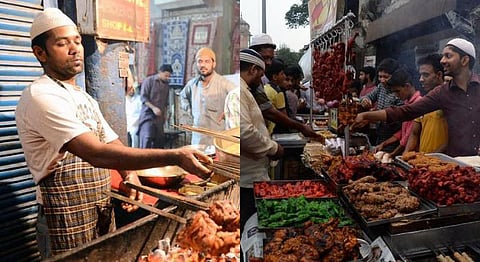
- HOMEGROWN WORLD
- #HGCREATORS
- #HGEXPLORE
- #HGVOICES
- #HGSHOP
- CAREERS
- ABOUT US
- CONTACT US

The year is 2022 and it feels like a dark, twisted dystopia –– not the kind where the earth and its inhabitants unite to fight our common enemy, but rather where the enemy lives in your home.
The new India, as we had imagined years ago embodied a deeper sense of community, a larger perspective of diversity, and a major shift in public policies. Now, however, India seems far from any of that, and the latest meat ban in the country only emphasises it.
After a Delhi mayor instructed meat shops in his jurisdiction to be shut for Navratri (which coincides with Ramadan this year), owing to the fact that it is ‘disrespectful’ to Hindu sentiments, a larger conversation on not only the meat ban but also India’s stand on minority-majority appeasement is taking place.
Before we critique any move, let’s look at some hard numbers. The Ministry of Fisheries, Animal Husbandry & Dairying in 2021 clarified that the production of meat in India grew by 5.15 per cent from 2014-15 to 2019-20. But, let’s also look at consumption. According to the Organisation for Economic Co-operation and Development, consumption of meat went from 5.2 million tonnes in 2015 to 6 million tonnes in 2020. In fact, post-2014, the consumption of buffalo meat (beef) has gained momentum. This leaves no doubt that India, over time, has consumed an increasing amount of meat, already countering the ethos of the meat ban. Additionally, according to government data, just four states –– Punjab, Haryana, Gujarat and Rajasthan –– are home to less than 40 per cent of non-vegetarians. The rest are home to more than 50 per cent non-vegetarians, with some southern states with over 97 per cent. On the whole, at least 70 per cent of India is non-vegetarian.
The numbers and facts all point to the fact that India is very clearly a non-vegetarian country, which begs the question, why ban meat?
When we know that a widespread Hindu supremacy movement is at play, this should essentially not come as a shock. What it does come across as is silly because even among Hindus, less than half are vegetarian. It may be confusing as to why this move would be initiated at all until one considers the larger agenda at play. We say Hindutva and Hindu supremacy now, but what influences this whole sphere is casteism, classism, and a pure religious aim.
Meat consumption, since archaic times, has been considered ‘impure’ and ‘dirty’ by upper class and caste Hindus –– the Brahmins always steered away from it. Opting for vegetarianism was considered a move to an upper social strata and class, and the stereotype of consuming meat only deepened. This meat ban of 2022 goes back to the roots of this long-gone time when ‘pure’ upper caste Hindus had the say in society. The Homogenisation of the Indian population in recent years is not simply limited to the Hindu religion, but also to its ‘purity’ by way of caste and class.
The discrimination is blatant and overt. The choice always exists –– to not eat meat and to let those who do be. No one should believe they may have the power to influence what another eats, but India’s trajectory in this scenario proves the opposite. It moves to instil an idea of fear, aversion, and hate toward those different from what is dictated acceptable, and as ‘modern’ India moves forward, it also sets itself up for potentially the biggest downfall it may have ever seen in terms of peace, harmony, equality. and justice for all.
If you enjoyed reading this, we suggest you also read:
